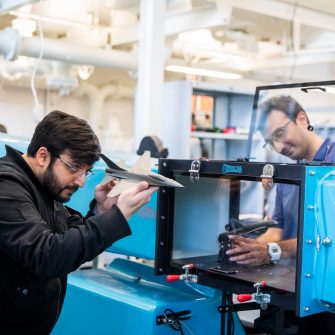Bachelor of Engineering (Honours) (Bioinformatics)
- Commencing Terms
- Term 1, 2 & 3
- Duration
- 4 Year(s)
- Delivery Mode
- Face-to-face (includes blended)
- Campus
-
Kensington
- Codes
- UAC code 425770
- Program code 3707
-
2025 Indicative first year full fee
- $8,000*
-
2025 Indicative full fee to complete degree
- $36,500*
-
2025 Indicative first year full fee
- $58,500*
-
2025 Indicative full fee to complete degree
- $253,500*

- Overview
- Entry requirements
- What will I study?
- Future careers
- Double degrees
- How to apply
- Fees & Scholarships
Overview
Bioinformatics is at the convergence of computing and the life sciences, and involves the development of technologies for storing, extracting, organising, analysing, interpreting and using the growing volume of genetic information being generated. The need to process and analyse vast amounts of information requires advances in both software technologies and hardware architectures.
In this degree you'll learn the foundation disciplines of bioinformatics, which includes biology (biochemistry, molecular biology and genetics), computing (algorithms, databases and programming), mathematics and statistics. You'll gain the skills to design and implement software for activities such as identifying the genes affected in specific cancer types.
Want to see more from UNSW Engineering?
Entry requirements
Assumed knowledge
Chemistry, Mathematics Extension 1.
Adjustment Factors
We offer a range of adjustment factor schemes that reward students for academic performance and extra-curricular achievements. These schemes also take into account a range of personal and educational disadvantages that may have affected your studies.
HSC Plus
This scheme rewards students who perform well in Year 12 subjects that are relevant to their preferred UNSW degree. You may be awarded up to five points.
Elite Athletes, Performers and Leaders (EAPL)
This program recognises achievements in the areas of sport, academia, leadership and music at an elite level. You may be eligible for up to five points.
Educational Access Scheme (EAS), opens in a new window
Factors such as illness, financial hardship, language difficulties or attending a particular school can mean you don't always get the best possible marks in Years 11 and 12. If one of these situations applies to you, submit an application for the Educational Access Scheme (EAS) via UAC. Eligible students can receive between 1 and 10 points towards their chosen UNSW degree.
Admission pathways
This degree is eligible for admission through our Portfolio Entry Early Conditional Offer Scheme. Complete a submission to demonstrate your passion and performance in relevant subjects. Successful applicants will receive an early conditional offer with an adjusted ATAR entry requirement.
English language requirements
You may be asked to provide evidence of your English proficiency to study at UNSW depending on your educational background and citizenship. English language skills are vitally important for coping with lectures, tutorials, assignments and examinations - this is why UNSW requires a minimum English language competency for enrolment.
If you’re completing an Australian Year 12 qualification (e.g. NSW HSC or equivalent), you do not need to provide anything extra to prove your proficiency. Your qualification will be used as evidence of your English proficiency.
If you do need to provide evidence of your English proficiency, this will be indicated in your application. You can prove this by providing evidence that you meet one or more of the following criteria:
- English language tests and university English courses
- Prior study in the medium of English
- Other qualifications
If you need to improve your English skills before you start your degree, UNSW College’s Academic English Programs are for you. The programs are suitable for various English levels and help you prepare for university studies and life in Australia.
For more details, visit the English Language Requirements page.
International direct entry
| Qualifications | Direct entry requirement |
|---|---|
|
International ATAR
|
85.0
|
| UNSW Foundation Studies GPA |
7.5
|
|
Great Britain General Certificate of Education (GCE A levels)
|
11.0
|
|
International Baccalaureate Diploma (IB)
|
32.0
|
|
Scholastic Aptitude Test (SAT) (after 2016)
|
1210.0
|
We do not accept secondary qualifications from this country. We may accept tertiary study results, please contact us for more information.
Please contact us for direct entry requirements.
Admission pathways
If you do not meet the requirements for direct entry into your chosen degree, you may be eligible for a pathway program with UNSW College. UNSW College provides alternative entry options using university-approved content so that you can start your UNSW journey with confidence.
English language requirements
You may be asked to provide evidence of your English proficiency to study at UNSW depending on whether you are from an English-speaking background or non-English speaking background. English language skills are vitally important for coping with lectures, tutorials, assignments and examinations - this is why UNSW requires a minimum English language competency for enrolment.
If English is not your first language, you’ll need to provide proof of your English proficiency before you can be given an offer to study at UNSW. You can do this by providing evidence that you meet one or more of the following criteria:
- English language tests and university English courses
- Prior study in the medium of English
- Other qualifications
If you need to improve your English skills before you start your degree, UNSW College’s Academic English Programs are for you. The programs are suitable for various English levels and help you prepare for university studies and life in Australia.
For more details, visit the English Language Requirements page.
Check the specific English language requirements for this program
Program structure
Full program structure
Degree structures can vary depending on the number of courses you choose and timetabling, to give you an indication you can consider the below.
In your first year you might study:
Two introductory courses in Mathematics
An introductory course in Physics,
and an introductory course in Computing
You may also study an introductory course related to your specialisation of choice. These courses equip you with the skills required for the rest of your Engineering degree.
All students study ENGG1000 “Introduction to Engineering Design and Innovation”. In this course you’ll learn to think the way that engineers think, developing solutions with limited budget, time and resources.
In your second year you’ll undertake:
Courses from your selected specialisations
Core courses to give you the fundamental knowledge in your area of interest
In your third and fourth year you’ll develop your knowledge further with a range of core and elective courses.
During your degree you’ll be required to complete two General Education electives. These courses help you broaden your education by completing several courses from outside the engineering faculty strengthening your cross-disciplinary thinking, developing a flexible approach and enhancing your critical analysis skills.
This degree also requires you to complete 60 days of industrial training, which gives you some on the job experience before graduating. This multidisciplinary educational approach connects students, academics and industry enabling you to develop the essential technical and professional skills, so you thrive in your future career.
Future careers
- Pharmaceutical and health
- Agrotech
- Banking and finance
- Computer security
- Bioinformatics
- Big Data and digital Services
- Consulting
Accreditation
This degree is globally recognised and is accredited by Engineers Australia and acknowledged by the Washington Accord. This degree is also accredited by the Australian Computer Society.
Part of this degree involves applying your skills through 60 days of approved industrial training in Australia or overseas. Your industrial training will give you a taste of a real-world professional engineering setting and the hands-on experience to become career-ready.
Double degrees
Combine your talents and passions to discover new opportunities suited to your unique strengths. Despite the name, double degrees are not double the workload! You'll study core courses in two areas of expertise, graduating with two qualifications in less time than it takes to complete two consecutive degrees.
Double your knowledge, skills, and career options with the Bachelor of Engineering (Honours) and:
- Advanced Mathematics (Honours)
- Advanced Science (Honours)
- Arts
- Commerce
- Computer Science
- Engineering Science
- Fine Arts
- Law
- Science
- Master of Biomedical Engineering*
*Double Degree only available with some Bachelor of Engineering (Honours) specialisations.
How to apply
Applications for undergraduate study from domestic students (Australian citizens, Australian permanent residents, Australian permanent humanitarian visa holders and New Zealand citizens) are processed by the Universities Admissions Centre (UAC).
Visit the Apply section of the UAC website, opens in a new window and you can nominate up to five degrees in order of preference, with the first being your most desired degree and university.
On-time applications for admission usually close at the end of September each year for Term 1 admission. Late applications can be submitted, but a late fee will apply. For study starting in Term 1, the majority of offers are made in December and January. Visit the UAC website, opens in a new window for key dates for admission outside of Term 1.
Ready to start your application?
For most international students, applications are submitted via our Apply Online service. We encourage you to submit your completed application as early as possible to ensure it will be processed in time for your preferred term.
Some high-demand programs with limited places, may have an earlier application deadline or may have an earlier commencement date. For more information visit our international applicant information page.
*If you are an international student studying an Australian qualification, go to the Universities Admission Centre (UAC), opens in a new window for application and UAC key dates. Note: If you are under 18 years of age, you need to make special arrangements. Read more.
Ready to start your application?
Fees & Scholarships
Commonwealth Supported Place: Student Contribution Band 2
*The student contribution for a Commonwealth Supported Place is an indication only of the amount payable in Year 1 based on a standard full-time load of 48 credit points (1.0 EFTSL). The actual student contribution you will be liable for depends on your individual program of study and the calendar year in which you enrol. Actual fees are calculated upon enrolment. Student contribution amounts are subject to annual review by the university and may increase each year during your studies (subject to caps determined by the Australian Government), effective at the start of each calendar year.
The indicative fees listed here are based on an estimated average and are for tuition only - other fees and charges are not included.
*Fees are subject to annual review by the University and may increase annually, with the new fees effective from the start of each calendar year. The indicative fees listed here are based on an estimated average and are for tuition only, other fees and charges are not included. The amount you pay will vary depending on the calendar year to enrol, the courses you select and whether your study load is more or less than 1 Equivalent Full Time Student Load (8 courses per year).
Indicative fees are a guide for comparison only based on current conditions and available data. You should not rely on indicative fees. More information on fees can be found at the UNSW fees website.
Indicative fees to complete the program have been calculated based on a percentage increase for every year of the program. Fee increases are assessed annually and may exceed the indicative figures listed here.
Indicative fees to complete the program include tuition plus an estimate of study-related costs of approximately $1,000 per year. To find out more about other costs, visit UNSW International.
Scholarships
At UNSW, we award over $83 million in scholarships each year. We pride ourselves on rewarding excellence and making university accessible to students from all walks of life. Whether you’re a domestic or international student, our range of scholarships, prizes and awards can support your journey.

QS World University Rankings, 2025

AFR Top100 Future Leaders Awards, 2020-2025

#1 Australian uni attended by start-up founders





